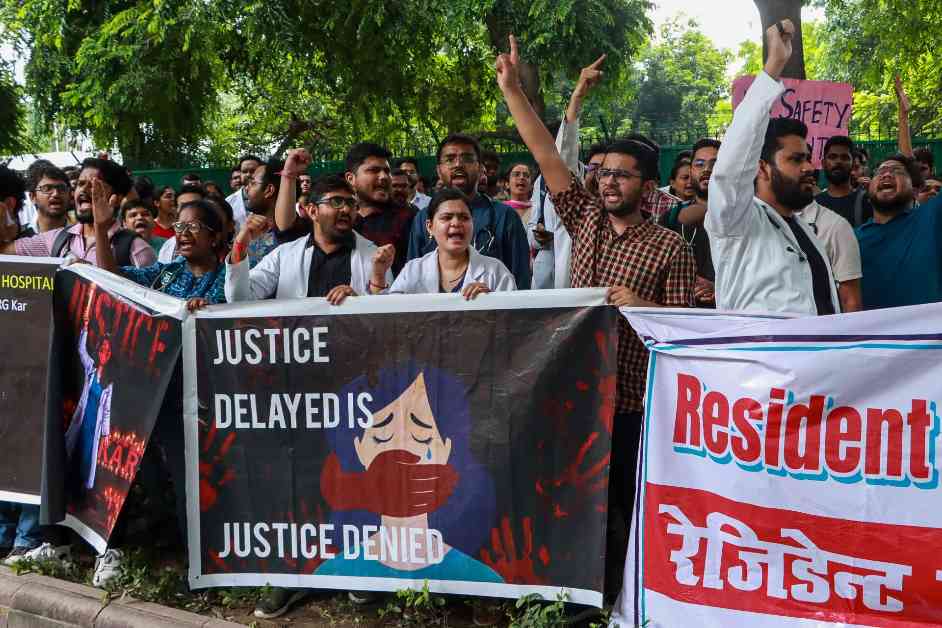Indian Court Orders Establishment of Medical Security Unit Following Murder of Female Doctor
In a tragic turn of events, the body of a 31-year-old female doctor was discovered, brutally murdered in the city of Golakata on August 9th. This heinous crime has sparked nationwide outrage, shedding light on the deep-rooted issue of violence against women in Indian society. In response to the escalating situation, medical associations from state hospitals across India have suspended their protests for the second week. The protesters have dubbed the slain doctor as “Aparna,” which translates to “Fearless” in English.
The group of protesters marched through Golakata, holding up signs demanding justice and workplace safety. In a swift response to these demands, the High Court of New Delhi issued an urgent order to address the grievances. The panel of judges, comprising three individuals, stated in their ruling that “the brutality of sexual violence and the nature of the crime have shaken the conscience of the nation.” The court mandated the formation of a national-level task force, consisting of leading medical professionals, to strategize and implement measures to prevent violence in healthcare facilities nationwide. Furthermore, regulations will be enforced to create a secure working environment.
The court emphasized the lack of adequate security measures within medical institutions, highlighting the physical and sexual violence faced by healthcare professionals as a major concern. The judges pointed out the absence of CCTV surveillance and the failure to screen weapons entering hospitals as significant vulnerabilities. The court concluded that “with an increasing number of women in the workforce, particularly in the fields of medicine and science, society plays a crucial role in creating a safe working environment based on human dignity. India cannot tolerate any more acts of violence or murder.”
Concerns over Safety and Security in Healthcare Facilities
The incident of the murdered doctor taking place in a hospital seminar room raises suspicions that she may have gone there for a brief respite during her long 36-hour shift. The autopsy results confirmed sexual assault, leading the victim’s parents to question whether their daughter may have been targeted by a group of protesters led by doctors and other medical staff. Tens of thousands of Indian citizens joined in the outcry, demanding justice.
Medical professionals also called for the enforcement of the Medical Protection Act, a legislation aimed at safeguarding healthcare personnel from violence and excessive workload that compromises their health, nutrition, and adequate rest. Relatives often accuse public health officials of negligence when patients die, leading to immediate violence against the staff. In a distressing incident in May, a nurse in a state hospital in Pihar was physically assaulted by the family of a deceased pregnant patient for alleged negligence during treatment.
Subheadings:
Outcry for Workplace Safety
The tragic murder of the female doctor has reignited the debate on workplace safety for healthcare professionals in India. The lack of security measures in hospitals has long been a pressing issue, with incidents of violence and assault against medical staff on the rise. The protesters’ demand for justice and a secure working environment reflects the urgent need for systemic changes to protect healthcare workers from harm.
Challenges Faced by Women in Healthcare
Women make up a significant portion of the healthcare workforce in India, contributing to advancements in medicine and science. However, they also face unique challenges and risks in their professional lives. The recent murder of the female doctor sheds light on the vulnerabilities that women in healthcare professions experience, from gender-based violence to inadequate workplace safety measures.
Legal Reforms and Enforcement
The call for the implementation of the Medical Protection Act underscores the need for legal reforms to protect healthcare professionals from violence and excessive workloads. Strengthening laws and ensuring their enforcement is crucial in creating a safe and supportive environment for medical staff. The court’s decision to establish a national-level task force signals a step towards improving security measures in healthcare facilities across the country.




















